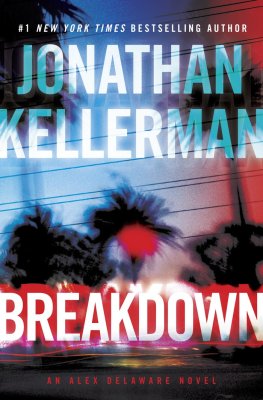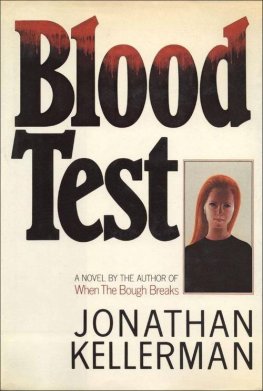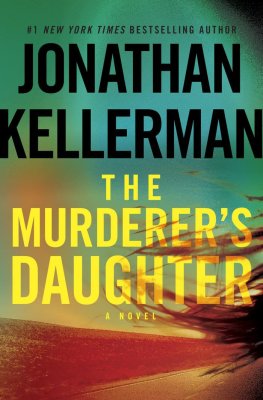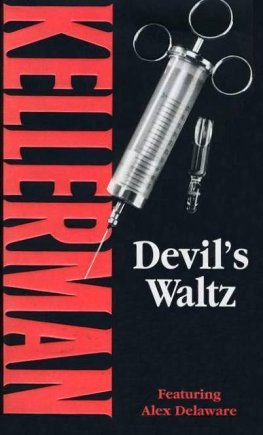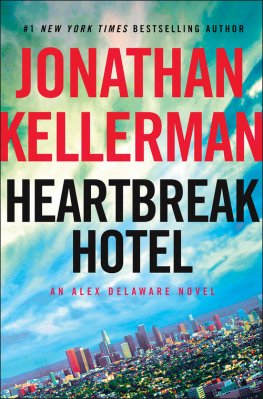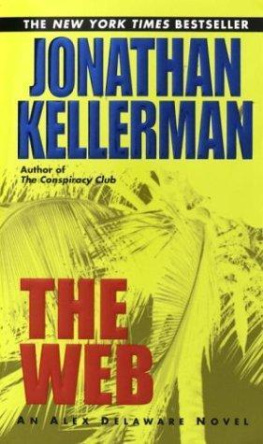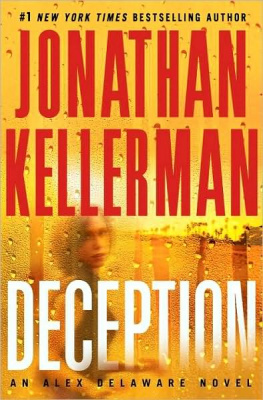
Jonathan Kellerman
The Murder Book
Book 16 in the Alex Delaware series, 2002
The day I got the murder book, I was still thinking about Paris. Red wine, bare trees, gray river, city of love. Everything that happened there. Now, this.
Robin and I flew in to Charles de Gaulle airport on a murky Monday in January. The trip had been my idea of a surprise. I'd pulled it together in one manic night, booking tickets on Air France and a room at a small hotel on the outskirts of the Eighth arrondissement, packing a suitcase for two, speeding the 125 freeway miles to San Diego. Showing up at Robin's room at the Del Coronado just before midnight with a dozen coral roses and a voil ! grin.
She came to the door wearing a white T-shirt and a hip-riding red sarong, auburn curls loose, chocolate eyes tired, no makeup. We embraced, then she pulled away and looked down at the suitcase. When I showed her the tickets, she turned her back and shielded me from her tears. Outside her window the night black ocean rolled, but this was no holiday on the beach. She'd left L.A. because I'd lied to her and put myself in danger. Listening to her cry now, I wondered if the damage was irreparable.
I asked what was wrong. As if I had nothing to do with it.
She said, "I'm just surprised."
We ordered room-service sandwiches, she closed the drapes, we made love.
" Paris," she said, slipping into a hotel bathrobe. "I can't believe you did all this." She sat down, brushed her hair, then stood. Approached the bed, stood over me, touched me. She let the robe slither from her body, straddled me, shut her eyes, lowered a breast to my mouth. When she came the second time, she rolled away, went silent.
I played with her hair and, as she fell asleep, the corners of her mouth lifted. Mona Lisa smile. In a couple of days, we'd be queuing up as robotically as any other tourists, straining for a glimpse of the real thing.
She'd fled to San Diego because a high school chum lived there- a thrice-married oral surgeon named Debra Dyer, whose current love interest was a banker from Mexico City. ("So many white teeth, Alex!") Francisco had suggested a day of shlock-shopping in Tijuana followed by an indeterminate stay at a leased beach house in Cabo San Lucas. Robin, feeling like a fifth wheel, had begged off, and called me, asking if I'd join her.
She'd been nervous about it. Apologizing for abandoning me. I didn't see it that way, at all. Figured her for the injured party.
I'd gotten myself in a bad situation because of poor planning. Blood had spilled and someone had died. Rationalizing the whole thing wasn't that tough: Innocent lives had been at stake, the good guys had won, I'd ended up on my feet. But as Robin roared away in her truck, I faced the truth:
My misadventures had little to do with noble intentions, lots to do with a personality flaw.
A long time ago, I'd chosen clinical psychology, the most sedentary of professions, telling myself that healing emotional wounds was how I wanted to spend the rest of my life. But it had been years since I'd conducted any long-term therapy. Not because, as I'd once let myself believe, I'd burned out on human misery. I had no problem with misery. My other life force-fed me gobs of misery.
The truth was cold: Once upon a time I had been drawn to the humanity and the challenge of the talking cure, but sitting in the office, dividing hour after hour by three quarters, ingesting other people's problems, had come to bore me.
In a sense, becoming a therapist had been a strange choice. I'd been a wild boy- poor sleeper, restless, overactive, high pain threshold, inclined to risk-taking and injuries. I quieted down a bit when I discovered books but found the classroom a jail and raced through school in order to escape. After graduating high school at sixteen, I bought an old car with summer-job cash, ignored my mother's tears and my father's scowling vote of no-confidence, and left the plains of Missouri. Ostensibly for college, but really for the threat and promise of California.
Molting like a snake. Needing something new.
Novelty had always been my drug. I craved insomnia and menace punctuated by long stretches of solitude, puzzles that hurt my head, infusions of bad company and the delicious repellence of meeting up with the slimy things that coiled under psychic rocks. A racing heart jolted me happy. The kick start of adrenaline punching my chest made me feel alive.
When life slowed down for too long, I grew hollow.
But for circumstance, I might've dealt with it by jumping out of airplanes or scaling bare rocks. Or worse.
Years ago, I'd met a homicide detective and that changed everything.
Robin had put up with it for a long time. Now she'd had enough and, sooner rather than later, I'd have to make some kind of decision.
She loved me. I know she did.
Maybe that's why she made it easy for me.
In Paris, clichs are just fine.
You leave your hotel, step out into the winter drizzle, walk aimlessly until you find yourself at a caf near the Jardin des Tuileries where you order overpriced baguettes and grainy, French-press coffee, then move on to the Louvre, where even during the off-season the lines prove daunting. So you cross the Seine on the Pont Royal, ignoring the motor din that washes the bridge, study the murk of the water below, try the Muse d'Orsay and murder your feet for a couple of hours, sucking in the fruits of genius. Then, deeper into the grubby side streets of the Left Bank, where you press yourself into the all-in-black throng, and laugh inwardly at an imagined wheezy accordion sound track overpowering the burping motor scooters and the whining Renaults.
It was early afternoon, near a shop in St. Germain, when it happened.
Robin and I had stopped into a dark, narrow men's haberdashery with a window full of aggressive neckties and slouching mannequins with pickpocket eyes. The rain had been coming in fitful bursts all day. The umbrella we'd cadged from the hotel concierge wasn't generous enough to shelter both of us and we each ended up more than half-wet. Robin didn't seem to mind. Her curls were beaded with droplets and her cheeks were flushed. She'd been quiet since we'd boarded the plane in L.A., sleeping for most of the flight, refusing dinner. This morning, we'd woken up late and barely talked. During the walk across the river, she seemed distracted- staring off at nothing in particular, holding my hand, then dropping it, then grabbing again and squeezing hard, as if scrambling to cover for some infraction. I put it down to jet lag.
The St. Germain stroll led us past a private school where beautiful, chittering adolescents spilled out onto the sidewalk, then a bookstore where I'd intended to browse until Robin pulled me into the clothing store, saying, "These are good silks, Alex. You could use something new."
The store peddled menswear, but smelled like a nail salon. The shopgirl was a skinny thing with hacked-up hair the color of eggplant rind and the anxiety of a new hire. Robin took a while thumbing through the goods, finally found me a very blue shirt and an extravagant red-and-gold tie of heavy weave, got my nod, asked the girl to wrap it up. Aubergine Tresses scurried to a back room and returned with a stout, cardiganed woman in her sixties who sized me up, took the shirt, and returned moments later brandishing a steaming iron in one hand and the garment in the other- newly pressed, on a hanger, shielded by a clear plastic bag.
Next page

